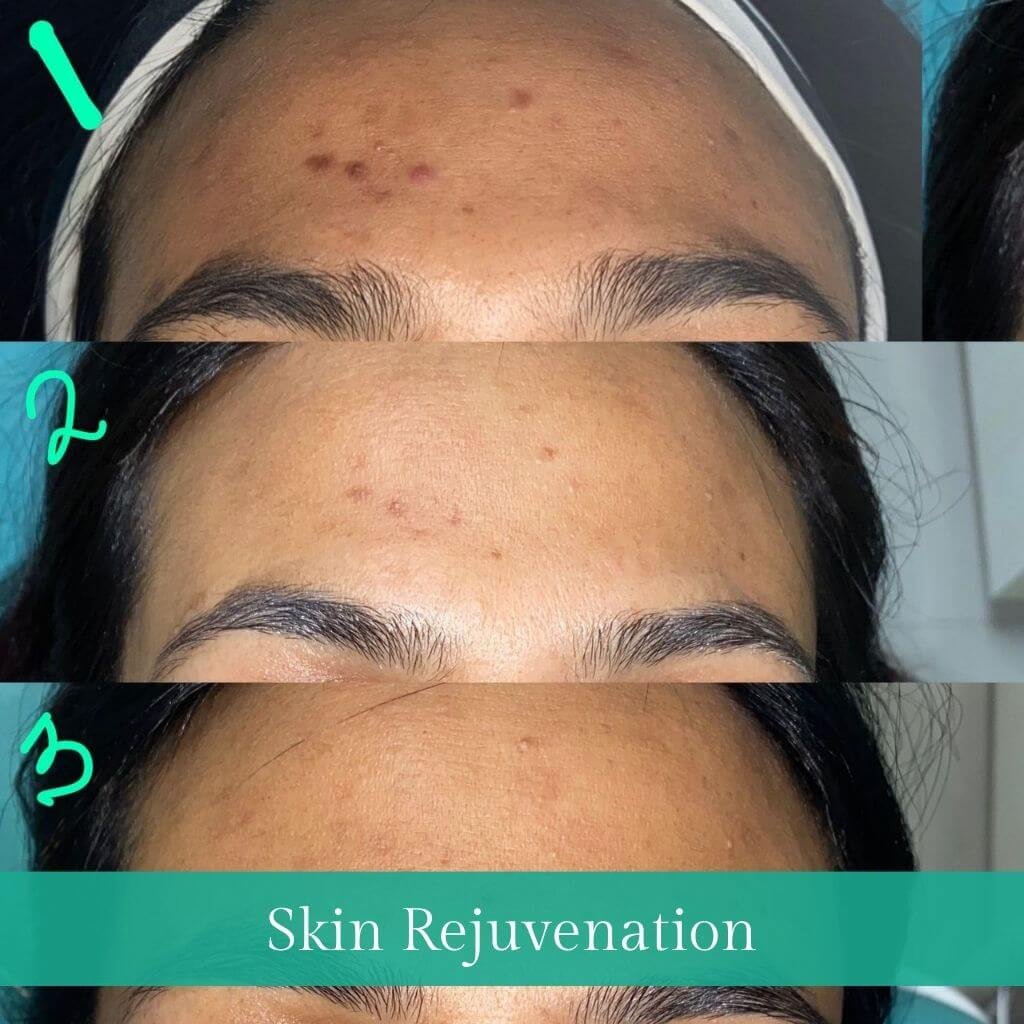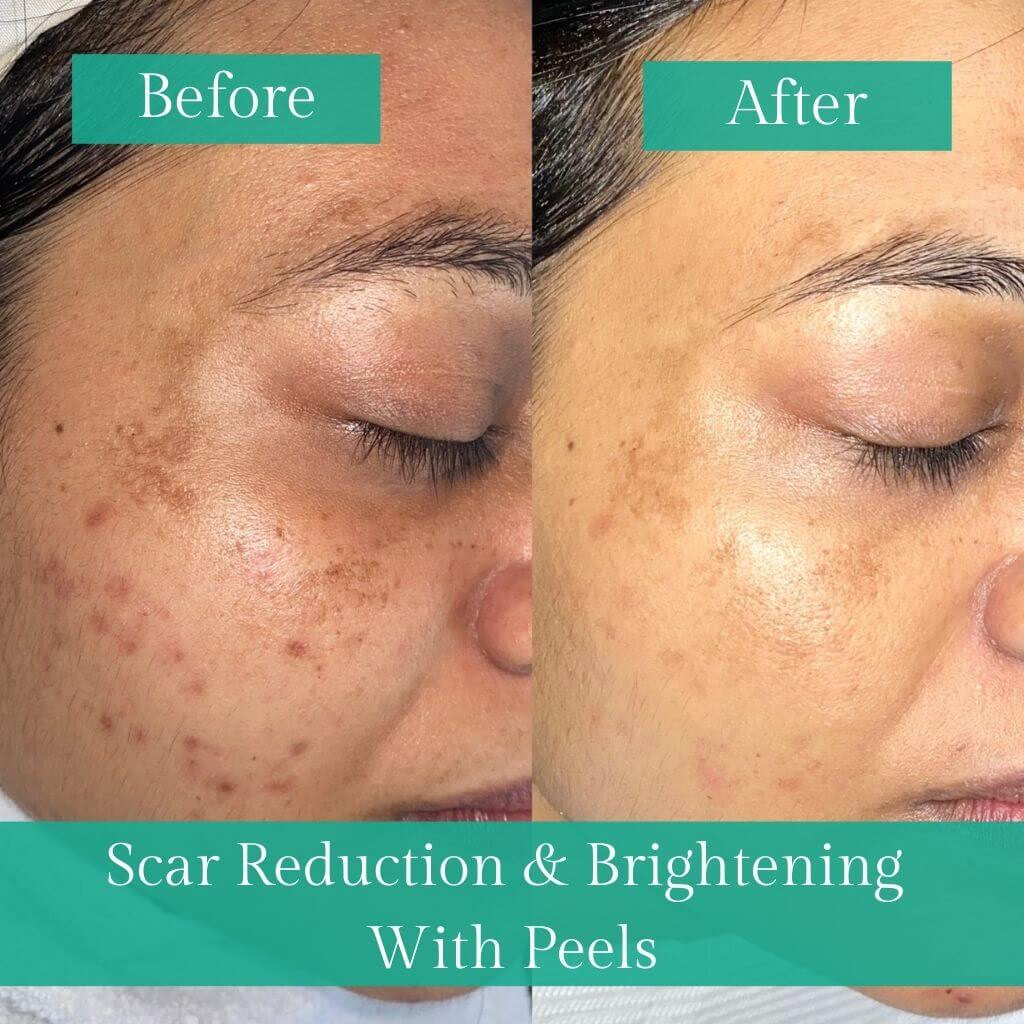What are Anti Acne Peels?
Are you tired of acne outbreaks? Do you pray before every major event or function to not wake up with a pimple popped up on your face? Is acne stripping your confidence? Well, fret no more. 'Anti acne peels’ are the solution!
This treatment method utilises a chemical solution to strip away the dead surface layer of the skin, minimise inflammation and, in turn, effectively minimise the visibility of acne, blackheads, and various imperfections on facial skin.
It's like a fresh start for your skin, allowing you to look and feel your best.
In this article, we'll discuss the key details of anti-acne peels, from who should consider this treatment to the benefits and post-peel care.
Key Takeaways
- Anti-acne peels effectively prevent and treat acne by removing dead skin cells, unclogging pores, and reducing inflammation.
- They provide skin rejuvenation, minimise bacterial accumulation, and enhance the look of acne scars and imperfections.
- Anti-acne peels are suitable for individuals with skin sensitivity or severe acne who may not find relief with lifestyle changes and topical medications alone.
- The procedure is safe and efficient, with minimal side effects, and post-peel care and maintenance are important for optimal results.
Understanding Acne and its Causes
Acne, a common skin issue, manifests as pimples, blackheads, whiteheads, cysts, or nodules, typically seen on the face, neck, chest, back, and shoulders. This condition occurs due to the obstruction of hair follicles by a combination of oil (sebum produced by skin cells) and dead skin cells, resulting in inflammation.
Factors that contribute to the development of acne are:
- Excess Oil Production: Overproducing oil (sebum) by the sebaceous glands can clog pores, promoting acne formation.
- Clogged Pores: When dead skin cells accumulate and mix with excess oil, they block hair follicles, creating an environment for bacteria to thrive.
- Bacteria: Propionibacterium acnes (P. acnes) is a bacterium commonly found on the skin. When trapped in clogged pores, it can cause inflammation, leading to acne.
- Hormonal Changes: Hormonal fluctuations, like those experienced during puberty, menstruation, pregnancy, or conditions such as polycystic ovary syndrome (PCOS), can stimulate acne by boosting the production of oil in the skin.
- Genetics: Family history can increase your likelihood of developing acne, especially if your parents also had it.
- Certain Medications: Some medications, including corticosteroids, contraceptives, and drugs containing lithium or androgens, may contribute to acne development.
- Diet: While research on diet's direct impact on acne is ongoing, certain foods high in carbohydrates and dairy products might exacerbate breakouts in some individuals.
- Stress: High-stress levels can worsen acne due to hormonal changes that increase oil production.
What are Anti-Acne Peels
Anti-acne peels, also called chemical peels for treating/minimising acne, are specialised skincare treatments to tackle acne and refine skin texture. These peels utilise acids such as salicylic, glycolic, mandelic, or lactic acid to gently exfoliate the skin, unclog pores, and diminish acne blemishes. By eliminating the outer skin layer, they stimulate cell renewal, encouraging the growth of fresh, healthier skin.
These peels range in potency and target various acne severities, from mild to more pronounced cases. When administered properly, often under professional guidance, acne peels can significantly reduce acne, alleviate inflammation, and unveil a clearer, smoother complexion, revitalising the skin's appearance.
Who Should Consider Anti-Acne Peels?
For those seeking a brighter, more radiant complexion, peels can work wonders. They're fantastic for achieving an even, glowing skin tone. However, if you have a history of keloids or very sensitive skin or use retinoids in your regular skincare regime, you must inform your doctor beforehand. This ensures that they can customise the peel to suit your skin's needs, taking precautions to minimise any potential adverse reactions or complications.
Types of Anti-Acne Peels
There are several types of anti-acne peels, each employing different acids and strengths to target acne and improve skin texture:
- Glycolic Acid Peels: These peels use glycolic acid, derived from sugar cane, to exfoliate the skin gently. They aid in clearing clogged pores, decreasing inflammation, and enhancing the look of mild acne scars and fine lines.
- Salicylic Acid Peels: Ideal for oily and acne-prone skin, salicylic acid peels penetrate deep into pores, effectively clearing out debris, oil, and dead skin cells. They're excellent for treating blackheads, whiteheads, and inflammatory acne. These are some of the safest peels for sensitive skin and can be combined with mandelic acid for improved results.
- Lactic Acid Peels: Suitable for sensitive skin, lactic acid peels offer gentle exfoliation, targeting acne while also hydrating the skin. They help improve skin texture, reduce acne scars, and address pigmentation issues.
- Mandelic Acid Peels: These peels, derived from bitter almonds, are milder and suitable for sensitive skin. They work on reducing acne inflammation and addressing issues like hyperpigmentation.
- Jessner's Peel: This peel, blending salicylic acid, lactic acid, and resorcinol, effectively addresses moderate acne, diminishes oil production, and enhances skin texture.
The choice of peel depends on individual skin type, concerns, and the severity of acne. Consulting a trained cosmetologist, esthetician, or skincare professional helps determine the most suitable peel for specific skin needs.
Preparing for an Anti-Acne Peel
Getting ready for an anti-acne peel requires several steps to ensure the best outcomes and reduce the risk of potential side effects:
- Consultation: Arrange a consultation with a professional to evaluate your specific skin concerns and identify the most appropriate peel for your needs.
- Skincare Routine: Follow a gentle skincare routine in the weeks leading up to the peel. Avoid harsh products, exfoliants, or retinoids that could make your skin more sensitive.
- Sun Protection: Protect your skin daily from sun damage with sunscreen. Sunscreen aids in preventing post-peel hyperpigmentation and sensitivity.
- Avoid Hair Removal: Refrain from waxing, tweezing, or any other hair removal methods in the treatment area for at least a week before and after the peel to minimise skin irritation.
- Medications: Be sure to inform your doctor about any medications or supplements you're using. Certain medications may require adjustments prior to the peel.
- Pre-Peel Skincare: To prepare your skin, your doctor might recommend specific pre-peel skincare products, such as a gentle cleanser or moisturiser.
- Follow Instructions: Follow any pre-peel instructions provided by your skincare professional diligently to ensure optimal results and reduce the risk of complications.
Preparing your skin adequately before an anti-acne peel helps improve its receptiveness to the treatment and minimises potential adverse reactions. Always adhere to the guidance provided by your skincare professional for the best possible outcome. Post-peel home care or maintenance, as advised by your doctor, needs to be followed diligently for the best outcome.
The Anti-Acne Peel Procedure
- Cleansing: The skin is cleansed thoroughly to remove any makeup, oil, or debris, ensuring a clean surface for the peel.
- Preparation: A prep solution might be applied to degrease the skin and enhance the peel's penetration.
- Application: The peel solution, customised based on your skin type and concerns, is applied evenly to the treatment area. The solution may contain specific acids like glycolic, salicylic, or lactic acid, among others.
- Sensation Monitoring: During application, you may feel a slight tingling or stinging sensation, which is a normal part of the process.
- Neutralisation (if needed): Depending on the type of peel used, the solution may be neutralised after a specific duration to halt the exfoliation process.
- Post-Peel Care: Your skincare professional might apply soothing creams, moisturisers, or sunscreens to calm the skin and protect it from the sun.
- Post-Procedure Instructions: You'll receive detailed instructions on post-peel care, including skincare routines and products to use or avoid to optimise healing and results.
The procedure duration varies based on the type and strength of the peel. Mild peels might take 15-20 minutes, while deeper peels require longer application times.
Benefits of Anti-Acne Peels
- Acne Reduction: They effectively target and reduce acne by unclogging pores, eliminating excess oil, combating bacteria, and diminishing blackheads, whiteheads, and inflammatory lesions.
- Exfoliation: Peels promote gentle exfoliation, removing dead skin cells to unveil a smoother skin texture and a more even complexion.
- Improved Skin Tone: By reducing pigmentation irregularities and acne scars, these peels help in achieving a more balanced and even skin tone.
- Oil Regulation: They aid in controlling excess oil production, preventing future breakouts in oily or acne-prone skin.
- Collagen Stimulation: Some peels stimulate collagen production, enhancing skin elasticity and firmness over time.
- Pore Minimization: Regular use can reduce pore size and less visible pores, contributing to a smoother skin appearance.
- Enhanced Skincare Product Absorption: Peels function by removing the upper layer of dead skin cells, enhancing the penetration of skincare products and maximising their benefits.
- Youthful Glow: Over time, consistent use of peels can result in a radiant, youthful complexion by encouraging cell turnover and skin renewal.
However, individual outcomes may vary based on skin type, acne severity, and the peel type used. Consulting a skin care professional ensures the most suitable treatment for specific skin concerns, maximising the benefits while minimising potential risks.
Post-Peel Care and Maintenance
- Follow Instructions: Adhere strictly to the post-peel instructions provided by your skincare professional. This may include specific guidelines for cleansing, moisturising, and sunscreen use.
- Moisturize: Apply a gentle, non-comedogenic moisturiser to help keep the skin hydrated and support the healing process. Avoiding beauty and skincare items containing harsh chemicals or fragrances is recommended, as they can potentially trigger skin irritation.
- Sun Protection: Shield your skin from sun exposure daily by applying a broad-spectrum sunscreen with SPF 30 or higher, even if you're indoors. Sunscreen helps prevent sun damage and hyperpigmentation.
- Avoid Exfoliation: Refrain from using harsh exfoliants, scrubs, or other aggressive skincare products after the peel. Let your skin heal naturally.
- Stay Hydrated: Ensuring ample water intake is crucial for internal hydration and aiding skin recovery.
- Avoid Sun Exposure: Minimise sun exposure, especially during peak hours, and consider wearing a wide-brimmed hat, covering your face with a scarf or seeking shade outdoors.
- Avoid Picking or Peeling: Resist the temptation to pick at any flaking or peeling skin post-peel. Doing so can cause irritation, prolong healing, and even lead to scarring.
- Limit Makeup Use: Avoid wearing makeup for the first few days after the peel to allow the skin to breathe and heal.
Frequently Asked Questions
Conclusion
In pursuing clearer, smoother, healthier skin, anti-acne peels are a valuable ally. These transformative treatments offer a solution for acne reduction, a pathway to renewed confidence, and a radiant complexion.
With their ability to unclog pores, diminish blemishes, and unveil fresher skin, anti-acne peels are a testament to the power of personalised skincare.
To embark on this journey towards vibrant, acne-free glowing skin, guided by expertise and care, discover the transformative benefits of anti-acne peels at Hope Dental and Esthetic Clinic, Noida.
Book your appointment today!

Dr. Mimansa Bhoj
BDS, MDS (Oral and Maxillofacial Surgeon)
University Gold medalist



